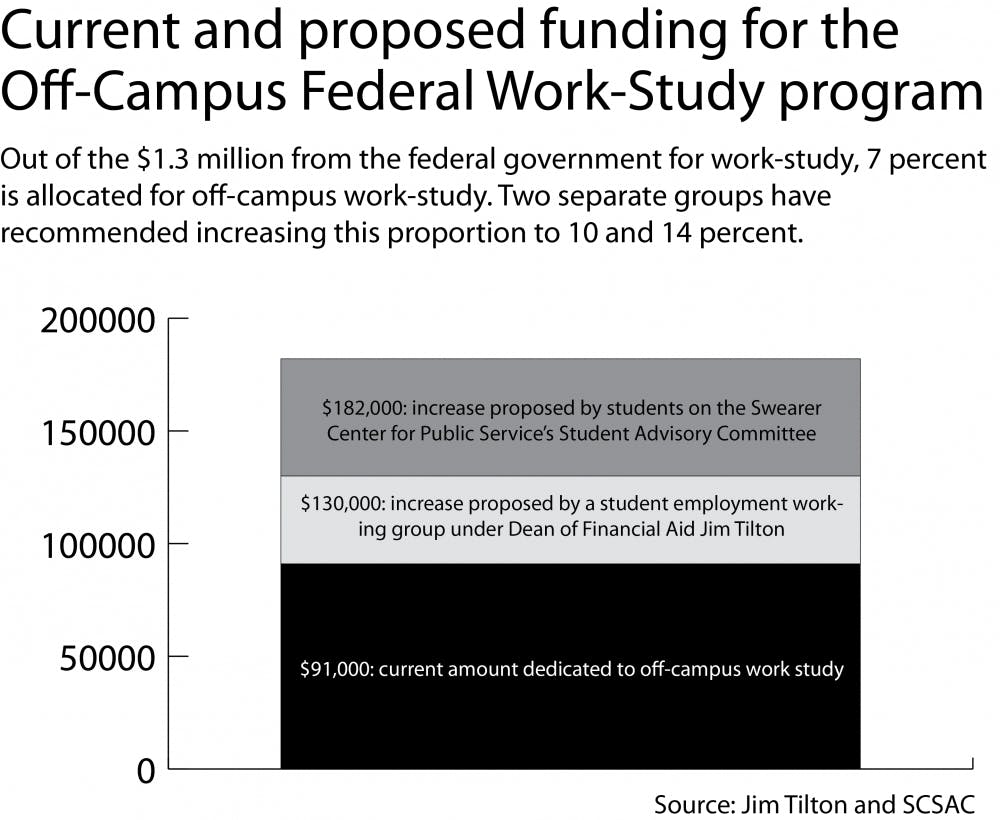Ever since the Swearer Center for Public Service streamlined the application process for Off-Campus Federal Work-Study last semester, the OCFWS program has attracted more students than its limited funding can support.
The program allows students who qualify for Federal Work-Study to get paid for their off-campus community service through the Swearer Center. “Instead of having 35 students in (OCFWS) during the school year as was the case in the past, we had over a hundred students who wanted to participate,” said Betsy Shimberg, assistant dean of the college and director of student development at the Swearer Center.
As a result, some applicants have been turned away from the OCFWS program, with about 25 students currently on a waitlist. Students and faculty alike have concluded that the OCFWS program needs more funding to meet growing student demand for off-campus positions, Shimberg said. Many low-income students face a trade-off between engaging in the community and working to support themselves, Shimberg explained. By paying students to work off-campus, the OCFWS program allows students “to be involved in the community … and to make some money doing it,” she added.
Of the $1.3 million the University receives from the federal government for work-study, 7 percent — the federally required minimum — is allocated to OCFWS, said Dean of Financial Aid Jim Tilton. This 7 percent allocation falls far below the percentage of Federal Work-Study funding that most peer schools devote to off-campus work, according to research conducted by the student employment working group that Tilton chaired.
To align the University with its peers and provide more opportunities for student employment in the local community, the student employment working group recommended that the University allocate 10 percent of its Federal Work-Study funding to OCFWS. If the administration accepts the proposal for this funding increase — which Tilton is currently drafting along with the Swearer Center — then funding for the OCFWS program would rise from around $91,000 to $130,000, Tilton said. Additionally, Tilton plans to work with the Swearer Center to reevaluate annually the needs of the OCFWS program.
Shimberg said she thinks that Tilton’s proposal, if accepted, would allow the Swearer Center to provide OCFWS positions to all the students currently on the waitlist for the program. Furthermore, students in OCFWS would be able to work more in order to earn more under the potential funding increase, Shimberg added.
Separately, students on the Swearer Center’s Student Advisory Committee recommended doubling the allocation for OCFWS to 14 percent of Federal Work-Study funding, said Ethan Morelion ’20, a member of the SAC in the Swearer Center. Although Morelion believes the OCFWS program could use more than 10 percent of the University’s Federal Work-Study funding, he expressed support for the incremental funding increase and annual reviews that Tilton plans to propose. “We’re definitely going to continue to push for 14 percent,” he added.
“We don’t want to turn people down from being involved in community engagement because there’s always a community need for more people to be involved,” Morelion added.
Tilton emphasized that increasing the portion of Federal Work-Study funding devoted to off-campus work would not decrease the funds available for on-campus work. “We spend much more on student employment than we receive (from the federal government) in work-study (funding),” Tilton said, noting that the University’s student employment budget exceeds $5 million. “Through the operations budget, we fund student employment. It isn’t that we’re taking away (from) one to give to another.”
Mikaela Karlsson ’18, a SAC member who is currently involved in OCFWS, has worked both on campus at the Nelson Fitness Center and off campus at a community organization called DownCity Design. She said her off-campus work has been far more valuable to her than her on-campus work.
“There’s just so much more opportunity for skill-building when you’re working with a community partner,” Karlsson said. “If you’re working for BUDS or working at the front desk at the Nelson, there’s not as much opportunity for growth.”
Carmen Ferran ’20.5 is paid to participate in the Brown Elementary After-School Mentoring program through off-campus work-study. If it weren’t for OCFWS, Ferran said she wouldn’t be able to participate in BEAM. Ferran added that she is grateful that OCFWS allows her to explore nonprofit work while earning “enough spending money to get by.”
Ferran and Karlsson both hope that the OCFWS program will receive increased funding to expand off-campus employment opportunities. “More kids should have the opportunity to work in the city and contribute to public good … and also not be broke during the school year,” Ferran said.
“Community engagement should not be limited to those who can afford to take unpaid or low-paying internships,” Karlsson agreed.





